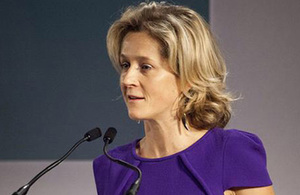Martha Lane Fox sets out her digital proposals for the NHS
Plans to ensure that everyone using the NHS can access free wi-fi are among recommendations made today by Martha Lane Fox.

Martha Lane Fox
She has made the recommendations in a bid to increase take-up of internet enabled services in health and care. This follows a commission from Health Secretary Jeremy Hunt who asked the former UK Digital Champion to look at ways in which there can be more digital inclusion across the NHS.
The 4 main recommendations by Baroness Martha Lane Fox to the National Information Board are:
- making sure those with the most health and social care needs, who are often the least likely to be online, are included first in any new digital tools being used across the NHS
- free wi-fi in every NHS building
- building the basic digital skills of the NHS workforce to ensure that everyone has the digital skills needed to support people’s health needs
- at least 10% of registered patients in each GP practice should be using a digital service such as online appointment booking, repeat prescriptions and access to records by 2017
Free wi-fi will allow patients staying in hospital to self-monitor their conditions using apps, maintain contact with social networks that can support recovery and crucially help them to stay in contact with family and friends.
It would also reduce the administrative burden on doctors, nurses and care staff, freeing up more time to be spent with patients, and enable safer working practices such as e-prescribing, known to reduce medication errors by 50%.
Digital heath tools and information can help people to better manage their health and avoid unnecessary GP visits and hospital admissions. Older people often lack computer confidence but have high health and social care needs and 33% of those with registered disabilities have never used the internet.
Baroness Martha Lane Fox said:
One of the founding principles of the NHS was to ensure that everyone - irrespective of means, age, sex, or occupation - should have equal opportunity to benefit from the best and most up to date medical and allied services available.
These principles are also the foundation of my recommendations and embedded within my new national organisation Doteveryone.
In the network age, universality, equity and quality must be at the very centre of how we build, adopt and scale new technologies in health. No-one must be left behind.
To encourage more people to use online health tools, including apps, to monitor and manage their health, Martha Lane Fox will recommend that doctors actively refer patients to those services that are proven to work.
Health Secretary Jeremy Hunt said:
Creating an NHS which is digitally fit for purpose in the 21st century is a key priority for this government. New investment of £1 billion in health technology announced in the autumn statement will help us to achieve this - making sure that patients and staff can access the services they need, helping to free up time and reduce costs.
Tim Kelsey, National Information Board Chair and NHS England National Director of Patients and Information, said:
Digital health tools can dramatically improve people’s lives and wellbeing. These bold challenges to the system to ensure that every person in the UK benefits are very welcome, and will galvanise work already underway to put power in the hands of patients, enabling them to take control of their care and improve their health.
To ensure that everyone working in the NHS makes best use of technology and data and feels confident to recommend online health services to patients, Martha Lane Fox will suggest that digital skills are cultivated within the NHS through training, support and mentorship programmes rolled out locally, regionally and nationally.
The recommendations will now be considered by the National Information Board.